2016 Summer Institute Participants
Leah Allen
 Leah Claire Allen is a Visiting Assistant Professor in Gender, Women’s, and Sexuality Studies at Grinnell College. Her current book project “In Praise of Bad Critics” revisits feminist critics from the 1960s and 1970s who have been labelled “bad critics” or “bad feminists” both within and outside of feminist circles. Her forthcoming article in Signs: Journal of Women in Culture and Society argues that Andrea Dworkin, a quintessential “bad” critic and feminist, is an unexpected ancestor of queer theory. Her research seeks to recuperate the methodologies and pedagogies that founded academic feminism with the aim of tracing the surprising history of contemporary queer and transgender theory in the forgotten and dismissed figures of the feminist past. At Grinnell, Professor Allen teaches Introduction to GWSS, Theory and Methods in GWSS, and the Senior Seminar in GWSS. Before coming to Grinnell, she taught courses at Duke University on masculinity and American literature; the sexual revolution; border literature; and sex and power. Professor Allen received her PhD in Literature from Duke University, MA in Gender, Sexuality, and Women’s Studies from Simon Fraser University, and BA in English from the University of Winnipeg.
Leah Claire Allen is a Visiting Assistant Professor in Gender, Women’s, and Sexuality Studies at Grinnell College. Her current book project “In Praise of Bad Critics” revisits feminist critics from the 1960s and 1970s who have been labelled “bad critics” or “bad feminists” both within and outside of feminist circles. Her forthcoming article in Signs: Journal of Women in Culture and Society argues that Andrea Dworkin, a quintessential “bad” critic and feminist, is an unexpected ancestor of queer theory. Her research seeks to recuperate the methodologies and pedagogies that founded academic feminism with the aim of tracing the surprising history of contemporary queer and transgender theory in the forgotten and dismissed figures of the feminist past. At Grinnell, Professor Allen teaches Introduction to GWSS, Theory and Methods in GWSS, and the Senior Seminar in GWSS. Before coming to Grinnell, she taught courses at Duke University on masculinity and American literature; the sexual revolution; border literature; and sex and power. Professor Allen received her PhD in Literature from Duke University, MA in Gender, Sexuality, and Women’s Studies from Simon Fraser University, and BA in English from the University of Winnipeg.
Mark Baechtel
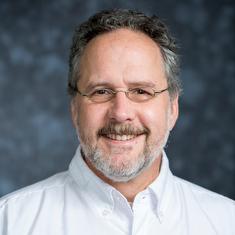 Mark grew up in New Carlisle, a small town in Southwest Ohio, not far from the border with Indiana. He values Grinnell’s sense of community, and its academic rigor because it tends to attract students who’re pretty serious about their education. He got his B.A. in Communications (Print Journalism) at American University in Washington, D.C. and his M.F.A. from the University of Iowa’s Writers’ Workshop, where he concentrated on fiction writing. He’s the staff person in charge of support for the College’s Debate Union—its oldest student group—and its club sports program. He also occasionally teaches classes in the Humanities Division. He’s a board member at the College’s Center for Prairie Studies. Additionally, he publishes poetry and fiction, has one book in print, and is currently trying to finish a novel. At the same time, he runs a book-editing business (Iowa Book Doctors), is engaged in the seemingly endless renovation of a 1880s house, and has two very active young daughters he does my best to keep up with.
Mark grew up in New Carlisle, a small town in Southwest Ohio, not far from the border with Indiana. He values Grinnell’s sense of community, and its academic rigor because it tends to attract students who’re pretty serious about their education. He got his B.A. in Communications (Print Journalism) at American University in Washington, D.C. and his M.F.A. from the University of Iowa’s Writers’ Workshop, where he concentrated on fiction writing. He’s the staff person in charge of support for the College’s Debate Union—its oldest student group—and its club sports program. He also occasionally teaches classes in the Humanities Division. He’s a board member at the College’s Center for Prairie Studies. Additionally, he publishes poetry and fiction, has one book in print, and is currently trying to finish a novel. At the same time, he runs a book-editing business (Iowa Book Doctors), is engaged in the seemingly endless renovation of a 1880s house, and has two very active young daughters he does my best to keep up with.
Audrey Devine-Eller
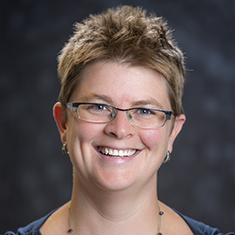 Audrey Devine-Eller is a cultural sociologist with interests in education and criminology. Her research focuses on teenagers’ transitions in and out of educational and carceral systems. She studies how daily interactions reproduce or disrupt inequalities. Currently, she’s writing about how high school students make post-secondary decisions (such as where and whether to go to college). This research is based on more than six years of NSF-funded qualitative research in New Jersey high schools. In another project using quantitative content analysis of “big data,” she examines the social construction of the bully in national media. She is a visiting assistant professor in the Department of Sociology at Grinnell College, and will join the faculty at College of St. Scholastica in Duluth, MN this fall. She received her Ph.D. in 2012 from the Department of Sociology at Rutgers University, with a graduate certificate in Women’s and Gender Studies. She teaches sociology of education, culture, self & society, school-to-prison pipeline (visit our blog!), sociological theory, qualitative & quantitative methods, and introduction to sociology.
Audrey Devine-Eller is a cultural sociologist with interests in education and criminology. Her research focuses on teenagers’ transitions in and out of educational and carceral systems. She studies how daily interactions reproduce or disrupt inequalities. Currently, she’s writing about how high school students make post-secondary decisions (such as where and whether to go to college). This research is based on more than six years of NSF-funded qualitative research in New Jersey high schools. In another project using quantitative content analysis of “big data,” she examines the social construction of the bully in national media. She is a visiting assistant professor in the Department of Sociology at Grinnell College, and will join the faculty at College of St. Scholastica in Duluth, MN this fall. She received her Ph.D. in 2012 from the Department of Sociology at Rutgers University, with a graduate certificate in Women’s and Gender Studies. She teaches sociology of education, culture, self & society, school-to-prison pipeline (visit our blog!), sociological theory, qualitative & quantitative methods, and introduction to sociology.
Barbara Eckstein
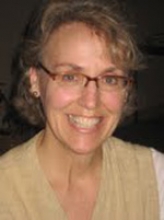 Barbara is a Professor of English at the University of Iowa. Her research interests include literature, space, and place. She has published the following three books: Sustaining New Orleans: Literature and Local Memory, New York: Routledge, 2005. Story and Sustainability: Planning, Practice, and Possibility for American Cities. Co-edited with James Throgmorton. Cambridge, MA: MIT Press, 2003. The Language of Fiction in a World of Pain: Reading Politics as Paradox. Cultural Studies Series. Philadelphia: University of Pennsylvania Press, 1990. She also is working on a digital humanities project entitled The People’s Weather Map. Additionally, she is a member of the Executive Board of the Center for Global and Regional Environmental Research.
Barbara is a Professor of English at the University of Iowa. Her research interests include literature, space, and place. She has published the following three books: Sustaining New Orleans: Literature and Local Memory, New York: Routledge, 2005. Story and Sustainability: Planning, Practice, and Possibility for American Cities. Co-edited with James Throgmorton. Cambridge, MA: MIT Press, 2003. The Language of Fiction in a World of Pain: Reading Politics as Paradox. Cultural Studies Series. Philadelphia: University of Pennsylvania Press, 1990. She also is working on a digital humanities project entitled The People’s Weather Map. Additionally, she is a member of the Executive Board of the Center for Global and Regional Environmental Research.
Brian Ekdale
 Brian studies global digital cultures. His research looks at how and why people create media content in the digital era. He has a particular interest in media produced within and about Africa. Brian’s current research project focuses on hip-hop music video directors and DJs in Nairobi, Kenya. Brian has professional experience as a software trainer, instructional technologist, and video producer. His documentary 10 Days in Malawi was screened at 11 film festivals and won 8 awards.Since joining the UI faculty, Brian now teaches several courses that prepare students to be better consumers and producers of digital and social media. Brian is the faculty advisor for Ed on Campus the University of Iowa’s premiere magazine writing and editing organization.
Brian studies global digital cultures. His research looks at how and why people create media content in the digital era. He has a particular interest in media produced within and about Africa. Brian’s current research project focuses on hip-hop music video directors and DJs in Nairobi, Kenya. Brian has professional experience as a software trainer, instructional technologist, and video producer. His documentary 10 Days in Malawi was screened at 11 film festivals and won 8 awards.Since joining the UI faculty, Brian now teaches several courses that prepare students to be better consumers and producers of digital and social media. Brian is the faculty advisor for Ed on Campus the University of Iowa’s premiere magazine writing and editing organization.
Mariola Espinosa
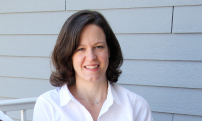 Mariola Espinosa is Associate Professor in the University of Iowa Department of History, and she holds an adjunct appointment in the Yale University School of Medicine. She is a specialist on the history of medicine and public health in the Caribbean. Her first book, Epidemic Invasions: Yellow Fever and the Limits of Cuban Independence, (University of Chicago Press 2009), is the story of how the devastating power of yellow fever dramatically transformed and defined the relationship between Cuba and the United States. Currently she is working a manuscript on how medical understandings of fever shaped the modern Caribbean. She is also the recipient of the University of Iowa May Brodbeck Humanities Fellowship for the year 2015-2016. For more information about Dr. Espinosa’s work, please visit her website: http://myweb.uiowa.edu/mespinosa/
Mariola Espinosa is Associate Professor in the University of Iowa Department of History, and she holds an adjunct appointment in the Yale University School of Medicine. She is a specialist on the history of medicine and public health in the Caribbean. Her first book, Epidemic Invasions: Yellow Fever and the Limits of Cuban Independence, (University of Chicago Press 2009), is the story of how the devastating power of yellow fever dramatically transformed and defined the relationship between Cuba and the United States. Currently she is working a manuscript on how medical understandings of fever shaped the modern Caribbean. She is also the recipient of the University of Iowa May Brodbeck Humanities Fellowship for the year 2015-2016. For more information about Dr. Espinosa’s work, please visit her website: http://myweb.uiowa.edu/mespinosa/
Loren Glass
 In both his teaching and scholarship, Loren finds himself centrally engaged with the relationship between literature and popular culture, mostly, though not exclusively, in the twentieth-century United States. Methodologically, his approach to this relationship combines sociological analysis of the cultural field with close readings of individual texts. His first book, Authors Inc.: Literary Celebrity in the Modern United States, 1880-1980, chronicles the emergence of literary celebrity in the late nineteenth century, as a strategy for negotiating the tensions between elite and popular conceptions of authorship, up through its contemporary manifestations. He holds a joint appointment with the Center for the Book, and his more recent scholarship engages the emergent fields of book studies and the new sociology of literature. His most recent book is a history of Grove Press entitled Counter-Culture Colophon: Grove Press, the Evergreen Review and the Incorporation of the Avant-Garde (Post*45 Series with Stanford University Press).
In both his teaching and scholarship, Loren finds himself centrally engaged with the relationship between literature and popular culture, mostly, though not exclusively, in the twentieth-century United States. Methodologically, his approach to this relationship combines sociological analysis of the cultural field with close readings of individual texts. His first book, Authors Inc.: Literary Celebrity in the Modern United States, 1880-1980, chronicles the emergence of literary celebrity in the late nineteenth century, as a strategy for negotiating the tensions between elite and popular conceptions of authorship, up through its contemporary manifestations. He holds a joint appointment with the Center for the Book, and his more recent scholarship engages the emergent fields of book studies and the new sociology of literature. His most recent book is a history of Grove Press entitled Counter-Culture Colophon: Grove Press, the Evergreen Review and the Incorporation of the Avant-Garde (Post*45 Series with Stanford University Press).
Elizabeth Heineman
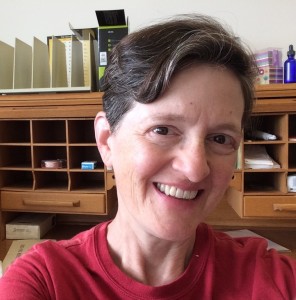 Lisa Heineman has been at the UI since 1999 and teaches courses in Germany, Europe, women, and gender. Her past research has examined gender, war, and memory in Germany; welfare states in comparative perspective (Fascist, Communist, and Democratic); and the significance of marital status for women. Out of this research came a book, What Difference Does a Husband Make: Women and Marital Status in Nazi and Postwar Germany (University of California Press, 1999) and many articles, including “The Hour of Women: Memories of Germany’s ‘Crisis Years’ and West German National Identity” American Historical Review (1996). With her 2002 article, “Sexuality and Nazism: The Doubly Unspeakable?” (Journal of the History of Sexuality), she began to work more intensely on the history of sexuality. In 2011, she published Before Porn was Legal: The Erotica Empire of Beate Uhse (University of Chicago Press) (Listen to a New Books in History podcast interview regarding this book here) and The History of Sexual Violence in Conflict Zones: From the Ancient World to the Era of Human Rights (editor, University of Pennsylvania Press). She is also author of the memoir Ghostbelly (Feminist Press, 2014).
Lisa Heineman has been at the UI since 1999 and teaches courses in Germany, Europe, women, and gender. Her past research has examined gender, war, and memory in Germany; welfare states in comparative perspective (Fascist, Communist, and Democratic); and the significance of marital status for women. Out of this research came a book, What Difference Does a Husband Make: Women and Marital Status in Nazi and Postwar Germany (University of California Press, 1999) and many articles, including “The Hour of Women: Memories of Germany’s ‘Crisis Years’ and West German National Identity” American Historical Review (1996). With her 2002 article, “Sexuality and Nazism: The Doubly Unspeakable?” (Journal of the History of Sexuality), she began to work more intensely on the history of sexuality. In 2011, she published Before Porn was Legal: The Erotica Empire of Beate Uhse (University of Chicago Press) (Listen to a New Books in History podcast interview regarding this book here) and The History of Sexual Violence in Conflict Zones: From the Ancient World to the Era of Human Rights (editor, University of Pennsylvania Press). She is also author of the memoir Ghostbelly (Feminist Press, 2014).
Patrick Inglis
 Patrick Inglis was born in Ottawa and grew up in Vancouver. He taught high school English for five years before moving to New York to begin his graduate studies in the Sociology Program at the City University of New York. His dissertation, It Will Become: Modern India and the Labor of Aspiration, which I am now developing into a book manuscript, was defended in June of 2013. He is currently an Assistant Professor of Sociology at Grinnell College, in Iowa, where he teaches core subjects in the major, including Introduction to Sociology and Methods, in addition to “The Asian Megacity,” which reflects one of my main areas of research. He also organizes the International and Comparative Studies Working Group at the College; meeting once a month, the group offers faculty in the social sciences and humanities opportunities to present drafts of early research in progress.
Patrick Inglis was born in Ottawa and grew up in Vancouver. He taught high school English for five years before moving to New York to begin his graduate studies in the Sociology Program at the City University of New York. His dissertation, It Will Become: Modern India and the Labor of Aspiration, which I am now developing into a book manuscript, was defended in June of 2013. He is currently an Assistant Professor of Sociology at Grinnell College, in Iowa, where he teaches core subjects in the major, including Introduction to Sociology and Methods, in addition to “The Asian Megacity,” which reflects one of my main areas of research. He also organizes the International and Comparative Studies Working Group at the College; meeting once a month, the group offers faculty in the social sciences and humanities opportunities to present drafts of early research in progress.
Matthew Kluber
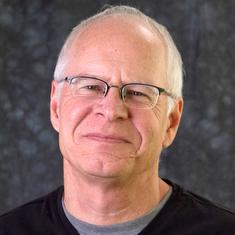 Matthew Kluber teaches print media, digital media, drawing and hybrid media. Kluber holds a master of fine arts degree from the University of Iowa and a bachelor of fine arts degree from the Rhode Island School of Design. He has taught at the University of Iowa and at Iowa State University and was Artist-in-Residence at the Des Moines Art Center, Des Moines, Iowa. Kluber has shown his prints, drawings, paintings and digital work at galleries and museums including: 123 Watts Gallery in New York City, Klein Art Works in Chicago, Rudolph Poissant Gallery in Houston, the Portland Museum of Art in Oregon, the Austin Museum of Art in Texas, the Bemis Center for Contemporary Art and Joslyn Art Museum in Omaha, and at the Des Moines Art Center, the University of Iowa Museum of Art, and the Faulconer Gallery, Grinnell College. Matthew Kluber has exhibited his paintings/projections, films, and drawings at galleries and museums including: the Museum of Contemporary Art Shanghai, China, FOCUS09/Art Basel, Switzerland; The Painting Center, New York; Klein Art Works, Chicago; Dolphin Gallery, Kansas City; Zane Bennet Project Space, Santa Fe; the Portland Museum of Art, Oregon; The Micro Museum, Brooklyn; the Austin Museum of Art, Texas; the Grand Rapids Art Museum, Michigan; Bemis Center for Contemporary Art and Joslyn Art Museum in Omaha; the Des Moines Art Center and the University of Iowa Museum of Art.
Matthew Kluber teaches print media, digital media, drawing and hybrid media. Kluber holds a master of fine arts degree from the University of Iowa and a bachelor of fine arts degree from the Rhode Island School of Design. He has taught at the University of Iowa and at Iowa State University and was Artist-in-Residence at the Des Moines Art Center, Des Moines, Iowa. Kluber has shown his prints, drawings, paintings and digital work at galleries and museums including: 123 Watts Gallery in New York City, Klein Art Works in Chicago, Rudolph Poissant Gallery in Houston, the Portland Museum of Art in Oregon, the Austin Museum of Art in Texas, the Bemis Center for Contemporary Art and Joslyn Art Museum in Omaha, and at the Des Moines Art Center, the University of Iowa Museum of Art, and the Faulconer Gallery, Grinnell College. Matthew Kluber has exhibited his paintings/projections, films, and drawings at galleries and museums including: the Museum of Contemporary Art Shanghai, China, FOCUS09/Art Basel, Switzerland; The Painting Center, New York; Klein Art Works, Chicago; Dolphin Gallery, Kansas City; Zane Bennet Project Space, Santa Fe; the Portland Museum of Art, Oregon; The Micro Museum, Brooklyn; the Austin Museum of Art, Texas; the Grand Rapids Art Museum, Michigan; Bemis Center for Contemporary Art and Joslyn Art Museum in Omaha; the Des Moines Art Center and the University of Iowa Museum of Art.
Shonda Kuiper
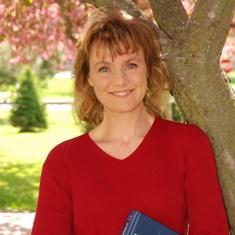 Professor Kuiper’s courses at Grinnell emphasize the application of statistics to multiple disciplines, a topic she also emphasizes in her research. Prior to teaching, she worked as a senior engineer and consulting statistician for Hallmark Greeting Cards. She also serves as a statistical consultant for student and faculty research. Collaboration with her Grinnell colleagues and students has led to published papers on such diverse topics as asthma prevalence, biochemical properties of acetylcholine receptors, and patterns of bird migration. Professor Kuiper has also frequently published and presented on statistics pedagogy with an emphasis on bringing interdisciplinary research into the classroom. She is currently chair of the American Statistical Association/Mathematical Association of America Joint Committee on Statistics Education. Partially supported by a grant from the National Science Foundation’s Course, Curriculum, and Laboratory Improvement program, she developed Stat2Labs, a set of lab modules that enable students to apply statistical analysis to research problems from the sciences and social sciences, such as population growth modeling and global surface temperature estimation. This resource was awarded a MERLOT Classics Award in 2012. Her textbook, Practicing Statistics: Guided Investigations for the Second Course, was also a product of Professor Kuiper’s first NSF grant. This book aims to appeal to students from many disciplines by teaching advanced statistical concepts (such as multiple regression, nonparametric methods, and survival analysis) in the context of real-world research questions. She has recently received a second grant from the National Science Foundation, a collaborative work with the United States Military Academy, to develop a set of laboratory modules using Web-based games. In her spare time she enjoys spending time with her husband and two boys, painting, playing guitar, and training horses.
Professor Kuiper’s courses at Grinnell emphasize the application of statistics to multiple disciplines, a topic she also emphasizes in her research. Prior to teaching, she worked as a senior engineer and consulting statistician for Hallmark Greeting Cards. She also serves as a statistical consultant for student and faculty research. Collaboration with her Grinnell colleagues and students has led to published papers on such diverse topics as asthma prevalence, biochemical properties of acetylcholine receptors, and patterns of bird migration. Professor Kuiper has also frequently published and presented on statistics pedagogy with an emphasis on bringing interdisciplinary research into the classroom. She is currently chair of the American Statistical Association/Mathematical Association of America Joint Committee on Statistics Education. Partially supported by a grant from the National Science Foundation’s Course, Curriculum, and Laboratory Improvement program, she developed Stat2Labs, a set of lab modules that enable students to apply statistical analysis to research problems from the sciences and social sciences, such as population growth modeling and global surface temperature estimation. This resource was awarded a MERLOT Classics Award in 2012. Her textbook, Practicing Statistics: Guided Investigations for the Second Course, was also a product of Professor Kuiper’s first NSF grant. This book aims to appeal to students from many disciplines by teaching advanced statistical concepts (such as multiple regression, nonparametric methods, and survival analysis) in the context of real-world research questions. She has recently received a second grant from the National Science Foundation, a collaborative work with the United States Military Academy, to develop a set of laboratory modules using Web-based games. In her spare time she enjoys spending time with her husband and two boys, painting, playing guitar, and training horses.
Mark Laver
 Saxophonist and ethnomusicologist Mark Laver is an Assistant Professor of Music at Grinnell College, where he directs the jazz band and teaches classes on jazz and popular music. Laver’s research focuses on the intersections between jazz, improvisation, and neoliberal capitalism. His book, Jazz Sells: Music, Marketing, and Meaning (Routledge, 2015), explores the use of jazz music in advertising, marketing, and branding. Other publications include “Freedom of Choice: Jazz, Neoliberalism, and the Lincoln Center” (Popular Music and Society 38), “Rebels and Volkswagens: Advertising, Charles Mingus, and the Commodification of Dissent” (Black Music Research Journal, 2014) “Improvise!™: Improvisation and the Aesthetics of Neoliberalism” (Critical Studies in Improvisation, 2013), and “Gender, Genius, and Rock and Roll in ‘Roy Orbison and Friends: A Black and White Night’” (Popular Music 30). Most recently, he co-edited a collection of essays with Dr. Ajay Heble called Improvisation and Music Education: Beyond the Classroom (Routledge, 2016). Laver is a Research Associate with the International Institute for Critical Studies in Improvisation. He completed his PhD in Ethnomusicology at the University of Toronto in 2011.
Saxophonist and ethnomusicologist Mark Laver is an Assistant Professor of Music at Grinnell College, where he directs the jazz band and teaches classes on jazz and popular music. Laver’s research focuses on the intersections between jazz, improvisation, and neoliberal capitalism. His book, Jazz Sells: Music, Marketing, and Meaning (Routledge, 2015), explores the use of jazz music in advertising, marketing, and branding. Other publications include “Freedom of Choice: Jazz, Neoliberalism, and the Lincoln Center” (Popular Music and Society 38), “Rebels and Volkswagens: Advertising, Charles Mingus, and the Commodification of Dissent” (Black Music Research Journal, 2014) “Improvise!™: Improvisation and the Aesthetics of Neoliberalism” (Critical Studies in Improvisation, 2013), and “Gender, Genius, and Rock and Roll in ‘Roy Orbison and Friends: A Black and White Night’” (Popular Music 30). Most recently, he co-edited a collection of essays with Dr. Ajay Heble called Improvisation and Music Education: Beyond the Classroom (Routledge, 2016). Laver is a Research Associate with the International Institute for Critical Studies in Improvisation. He completed his PhD in Ethnomusicology at the University of Toronto in 2011.
Deborah Michaels
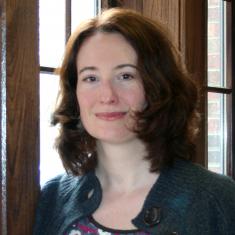 Deborah L. Michaels is an Associate Professor of Education who teaches courses in History of Education, International and Comparative Education, General Teaching Methods, and Social Studies Methods. She also mentors student teachers receiving their secondary-school teaching license in any of the social studies disciplines (most commonly in history, government, psychology, sociology, and economics). Deborah has received numerous national grants and fellowships including a National Academy of Education Postdoctoral Fellowship (2013-2014), a Fulbright Fellowship (2004-2005), a US State Department Speaker Grant (2006), and a Spencer Foundation Dissertation Fellowship (2006-2007). She earned her B.S. at Cornell University and her M.A. and Ph.D. in Educational Foundations and Policy at the University of Michigan. Her research focuses on national identity politics and the exclusion of minorities in schooling. With funding from the National Academy of Education and Spencer Foundation, she is currently working on a book project tentatively titled Revising the Nation: Citizenship and Belonging in Slovak Schooling, 1910-2010. She is a co-editor and author in three special journal issues (2011-2012) dedicated to investigating how schools teach the Holocaust in post-socialist Europe. Deborah has been conducting research since 2009 with Native Americans, including the Meskwaki Community in Iowa, on how to make history teaching more inclusive of indigenous peoples’ perspectives.
Deborah L. Michaels is an Associate Professor of Education who teaches courses in History of Education, International and Comparative Education, General Teaching Methods, and Social Studies Methods. She also mentors student teachers receiving their secondary-school teaching license in any of the social studies disciplines (most commonly in history, government, psychology, sociology, and economics). Deborah has received numerous national grants and fellowships including a National Academy of Education Postdoctoral Fellowship (2013-2014), a Fulbright Fellowship (2004-2005), a US State Department Speaker Grant (2006), and a Spencer Foundation Dissertation Fellowship (2006-2007). She earned her B.S. at Cornell University and her M.A. and Ph.D. in Educational Foundations and Policy at the University of Michigan. Her research focuses on national identity politics and the exclusion of minorities in schooling. With funding from the National Academy of Education and Spencer Foundation, she is currently working on a book project tentatively titled Revising the Nation: Citizenship and Belonging in Slovak Schooling, 1910-2010. She is a co-editor and author in three special journal issues (2011-2012) dedicated to investigating how schools teach the Holocaust in post-socialist Europe. Deborah has been conducting research since 2009 with Native Americans, including the Meskwaki Community in Iowa, on how to make history teaching more inclusive of indigenous peoples’ perspectives.
Celeste Miller
 Celeste Miller is a multi-faceted dance artist whose career includes solo performance, choreography, arts activism and animator of community art projects. Her unique performance style is a combination of spoken word and movement that plumbs narrative for physical imagery in juxtaposed connections with words. Often called the dance whisperer, Miller investigates dance as a powerful tool for art-making, research and activism. Miller’s work has been recognized by numerous grants, fellowships and commissions including Choreography Fellowship from the National Endowment for the Arts, Individual Artist Award for Solo Theatrical Performance by the Maryland State Arts Council, Massachusetts New Playwrights Fellowship; as well as awards from the Rockefeller Foundation, Atlanta Circle of Drama Critics, Mayor of the City of Atlanta and arts councils in Georgia, Massachusetts and Maryland. Commissions for her work have come from the High Museum of Art, Atlanta; Augusta Museum of Art, Grinnell College, Emory University, American Festival Project, Smithsonian’s Discovery Theatre, Boston Dance Umbrella, American Festival Project, Columbia College, New Orleans Ballet Dance Collective, Florida Dance Festival and more. For more information, see www.celestemiller.com
Celeste Miller is a multi-faceted dance artist whose career includes solo performance, choreography, arts activism and animator of community art projects. Her unique performance style is a combination of spoken word and movement that plumbs narrative for physical imagery in juxtaposed connections with words. Often called the dance whisperer, Miller investigates dance as a powerful tool for art-making, research and activism. Miller’s work has been recognized by numerous grants, fellowships and commissions including Choreography Fellowship from the National Endowment for the Arts, Individual Artist Award for Solo Theatrical Performance by the Maryland State Arts Council, Massachusetts New Playwrights Fellowship; as well as awards from the Rockefeller Foundation, Atlanta Circle of Drama Critics, Mayor of the City of Atlanta and arts councils in Georgia, Massachusetts and Maryland. Commissions for her work have come from the High Museum of Art, Atlanta; Augusta Museum of Art, Grinnell College, Emory University, American Festival Project, Smithsonian’s Discovery Theatre, Boston Dance Umbrella, American Festival Project, Columbia College, New Orleans Ballet Dance Collective, Florida Dance Festival and more. For more information, see www.celestemiller.com
Kathleen (Casey) Oberlin
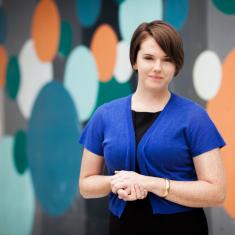 Casey is an Assistant Professor in the Department of Sociology at Grinnell College in Iowa. She is currently working on a book manuscript titled Mobilizing Conflict: The Creation Museum and the Creationist Social Movement. This research was funded by multiple sources including the National Science Foundation. Before arriving at Grinnell College, she received a PhD in Sociology from Indiana University in 2014. Prior to that she completed a BA and an MA in Sociology as well as a Master’s Certificate in Women’s and Gender Studies from DePaul University in Chicago, IL. Her research and teaching interests include the sociology of science, social movements, place and built environment, religion and science, medical sociology, and research methods. Please find more information about her here: kathleenoberlin.com
Casey is an Assistant Professor in the Department of Sociology at Grinnell College in Iowa. She is currently working on a book manuscript titled Mobilizing Conflict: The Creation Museum and the Creationist Social Movement. This research was funded by multiple sources including the National Science Foundation. Before arriving at Grinnell College, she received a PhD in Sociology from Indiana University in 2014. Prior to that she completed a BA and an MA in Sociology as well as a Master’s Certificate in Women’s and Gender Studies from DePaul University in Chicago, IL. Her research and teaching interests include the sociology of science, social movements, place and built environment, religion and science, medical sociology, and research methods. Please find more information about her here: kathleenoberlin.com
Mirzam Perez
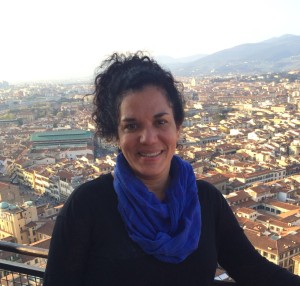 Mirzam C. Pérez is an Associate Professor and Chair of the Spanish Department at Grinnell College. In her most recent book, The Comedia of Virginity: Mary and the Politics of Seventeenth-Century Spanish Theater Mirzam used GIS to map processions and festivals in XVII century Spain. Her current research project Academic Festival Books and the Rise of Institutional Power in Early Modern Spain and Spanish America analyses the ways that universities used festivals and book publication to promote their institutional identity. In the past years Mirzam has also been experimenting with Digital Humanities applications in the undergraduate classroom. In Spring 2015 she designed a class assignment using Nvivo for textual analysis of Don Quixote. This spring she integrated Nvivo, Mapline, Neatline and OMEKA assignments in her seminar “Designing Empire: Plazas, Power and Urban Planning in Habsburg Spain and its colonies” to invite students to understand and visualize early modern cities in alternative ways.
Mirzam C. Pérez is an Associate Professor and Chair of the Spanish Department at Grinnell College. In her most recent book, The Comedia of Virginity: Mary and the Politics of Seventeenth-Century Spanish Theater Mirzam used GIS to map processions and festivals in XVII century Spain. Her current research project Academic Festival Books and the Rise of Institutional Power in Early Modern Spain and Spanish America analyses the ways that universities used festivals and book publication to promote their institutional identity. In the past years Mirzam has also been experimenting with Digital Humanities applications in the undergraduate classroom. In Spring 2015 she designed a class assignment using Nvivo for textual analysis of Don Quixote. This spring she integrated Nvivo, Mapline, Neatline and OMEKA assignments in her seminar “Designing Empire: Plazas, Power and Urban Planning in Habsburg Spain and its colonies” to invite students to understand and visualize early modern cities in alternative ways.
Samuel Rebelsky
Samuel A. Rebelsky is a Professor of Computer Science at Grinnell College. “SamR”, as his students call him, has been at Grinnell since 1997. (He therefore considers himself part of the Grinnell class of 2001.) Read more about SamR at his web site: http://www.cs.grinnell.edu/~rebelsky/
Dan Sinykin
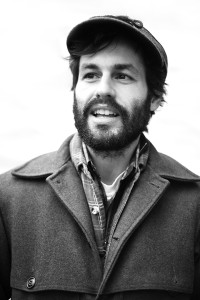 Dan Sinykin is a professor, literary critic, and a writer of fiction and creative nonfiction. His work has appeared or is forthcoming in Salon, Guernica, Post45, and American Literary History, among other publications. Working as an outdoor educator after college, he found himself sneaking in Wallace Stevens and Jorge Luis Borges, which was a good hint that he ought to pursue a job in the professoriat. He currently teaches at Grinnell College and has previously taught at Cornell University and Auburn Correctional Facility, a maximum security prison in upstate New York. The manuscript he is now revising for publication, After the Boom: Apocalypse and Economics in American Literature of the Neoliberal Period, argues that the economic crisis of the 1970s and the rise of neoliberalism established the conditions for a contemporary American literary form: the neoliberal apocalypse. Apocalyptic writing appears when collectivities perceive themselves as existentially threatened and hope seems foreclosed. At the point at which change seems unimaginable, apocalypse enters to imagine radical change as the only possibility. Focusing on James Baldwin, Cormac McCarthy, Leslie Marmon Silko, and David Foster Wallace, an unlikely group of U.S. writers, After the Boom illuminates the widespread tendency—in literature, politics, religion, and film—to figure our present as apocalyptic. Current works-in-progress include a project on the literature and poetics of microfinance and another on transformations in the publishing industry since 1970.
Dan Sinykin is a professor, literary critic, and a writer of fiction and creative nonfiction. His work has appeared or is forthcoming in Salon, Guernica, Post45, and American Literary History, among other publications. Working as an outdoor educator after college, he found himself sneaking in Wallace Stevens and Jorge Luis Borges, which was a good hint that he ought to pursue a job in the professoriat. He currently teaches at Grinnell College and has previously taught at Cornell University and Auburn Correctional Facility, a maximum security prison in upstate New York. The manuscript he is now revising for publication, After the Boom: Apocalypse and Economics in American Literature of the Neoliberal Period, argues that the economic crisis of the 1970s and the rise of neoliberalism established the conditions for a contemporary American literary form: the neoliberal apocalypse. Apocalyptic writing appears when collectivities perceive themselves as existentially threatened and hope seems foreclosed. At the point at which change seems unimaginable, apocalypse enters to imagine radical change as the only possibility. Focusing on James Baldwin, Cormac McCarthy, Leslie Marmon Silko, and David Foster Wallace, an unlikely group of U.S. writers, After the Boom illuminates the widespread tendency—in literature, politics, religion, and film—to figure our present as apocalyptic. Current works-in-progress include a project on the literature and poetics of microfinance and another on transformations in the publishing industry since 1970.
Jenna Supp-Montgomerie
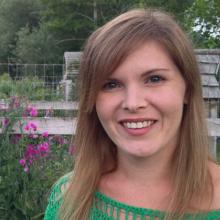 Jenna Supp-Montgomerie earned a Ph.D. in religious studies with a certificate in cultural studies at the University of North Carolina at Chapel Hill. She holds a joint appointment in Religious Studies and Communication Studies at the University of Iowa. Her research examines the relationships of religion, media, and technology. Jenna’s work focuses on the appearance of religious thinking and practices in everyday life, particularly as we adopt and negotiate technological change. She has published essays and book chapters on this theme, including “Planetary Subjects after the Death of Geography” in Planetary Loves: Gayatri Spivak, Postcoloniality, and Theology and “‘If Only You Could See What I’ve Seen Through Your Eyes’: Destabilized Spectatorship and Creation’s Chaos in Blade Runner” in CrossCurrents. She is currently working on a book about the vital influence of American Christianity on globalization. This study begins in 1858, when the Atlantic telegraph cable was first successfully strung across the ocean. At that moment, Americans declared the advent of a world unified by communication and marked by the ends of distance and war. This persistent rhetoric animated what it meant to be modern and American and today echoes in claims that the Internet creates a global village.
Jenna Supp-Montgomerie earned a Ph.D. in religious studies with a certificate in cultural studies at the University of North Carolina at Chapel Hill. She holds a joint appointment in Religious Studies and Communication Studies at the University of Iowa. Her research examines the relationships of religion, media, and technology. Jenna’s work focuses on the appearance of religious thinking and practices in everyday life, particularly as we adopt and negotiate technological change. She has published essays and book chapters on this theme, including “Planetary Subjects after the Death of Geography” in Planetary Loves: Gayatri Spivak, Postcoloniality, and Theology and “‘If Only You Could See What I’ve Seen Through Your Eyes’: Destabilized Spectatorship and Creation’s Chaos in Blade Runner” in CrossCurrents. She is currently working on a book about the vital influence of American Christianity on globalization. This study begins in 1858, when the Atlantic telegraph cable was first successfully strung across the ocean. At that moment, Americans declared the advent of a world unified by communication and marked by the ends of distance and war. This persistent rhetoric animated what it meant to be modern and American and today echoes in claims that the Internet creates a global village.
Mary Wise
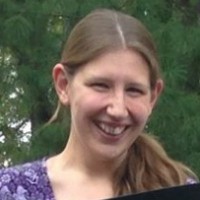 Mary Wise received a B.A. in History from Ohio University in June 2012. In September 2012, Mary moved to Madison, Wisconsin, to study with the Tribal Libraries, Archives, and Museums Project at the University of Wisconsin-Madison’s School of Library and Information. She completed her M.A. in Library and Information Studies in May 2014. Realizing that a firm grounding in humanistic training was an imperative for her to acquire in order to truly ground her work on the history of public parks in the Midwest, Mary sought out humanities programs that offered training in the public humanities; she applied to the University of Iowa because of the plethora of opportunities in the public humanities provided by the Obermann Center and the Obermann Center Working Group History Corps. Mary became a member of History Corps in fall 2014. Since then, she has completed several projects that examine Iowa’s complex history through History Corps. Through History Corps, she is currently working on a large tribal digital project with the Ioway and Meskwaki. The work she has completed exemplifies her core values as a scholar: collaboration, promotion of the digital humanities, intersectionality, and the dissemination of knowledge in a variety of formats.
Mary Wise received a B.A. in History from Ohio University in June 2012. In September 2012, Mary moved to Madison, Wisconsin, to study with the Tribal Libraries, Archives, and Museums Project at the University of Wisconsin-Madison’s School of Library and Information. She completed her M.A. in Library and Information Studies in May 2014. Realizing that a firm grounding in humanistic training was an imperative for her to acquire in order to truly ground her work on the history of public parks in the Midwest, Mary sought out humanities programs that offered training in the public humanities; she applied to the University of Iowa because of the plethora of opportunities in the public humanities provided by the Obermann Center and the Obermann Center Working Group History Corps. Mary became a member of History Corps in fall 2014. Since then, she has completed several projects that examine Iowa’s complex history through History Corps. Through History Corps, she is currently working on a large tribal digital project with the Ioway and Meskwaki. The work she has completed exemplifies her core values as a scholar: collaboration, promotion of the digital humanities, intersectionality, and the dissemination of knowledge in a variety of formats.

